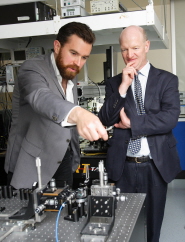Jul 6 2013
Mr Willetts was given a tour of the University of Bristol’s state-of-the-art Centre for Nanoscience and Quantum Information (NSQI) yesterday [4 July], where vibration and acoustic noise levels are among the lowest ever achieved, despite being located in the centre of Bristol.
 Professor Jeremy O'Brien and David Willetts. Image by Andre Regini
Professor Jeremy O'Brien and David Willetts. Image by Andre Regini
Inside, academics are pioneering the field of quantum technologies and they took the opportunity to show Mr Willetts how quantum devices have evolved to put the UK several years ahead of other nations in terms of research, development and application
Quantum mechanics describes how nature behaves at its most fundamental level, with quantum technologies seeking to harness the properties of individual atoms, electrons, photons and other bosons.
The resulting technologies offer ultra-secure communications, sensors of unprecedented precision and computers that are exponentially more powerful than any supercomputer for some tasks.
The University hopes to take these technologies out of the lab and engineer them into useful devices which will eventually be portable and low-cost. It’s working alongside some leading industry leaders, such as Nokia, Toshiba and BAE Systems, to integrate these concepts into new products.
Mr Willetts, the Minister for Universities and Science, was shown the world’s most sophisticated integrated optical quantum processor chip, which can be used to calculate the properties of molecules – an approach that could ultimately be used in the design of new materials, pharmaceutical drugs and clean energy devices.
He said: “Quantum technologies could be the future of computing, information and communications. Today’s visit to the University of Bristol has shown that UK researchers are leading the way in this exciting area of science, working with industry to develop new products.”
His tour focused on the Centre for Quantum Photonics (CQP), located within NSQI, which houses £1million worth of specialist equipment such as high-powered pulsed lasers and superconducting photon detectors.
Professor Jeremy O’Brien, Director of the CQP, said: “Quantum technologies are going to have a profound impact on every aspect of our economy and society in the future. We were glad of the opportunity to show the minister how we’re using this science to create useful technologies which will ultimately lead to economic growth for the UK.
“Quantum technologies will fundamentally change our lives and the first devices are only a few years from market. It’s a very exciting field.”
The CQP explores fundamental aspects of quantum mechanics, as well as work towards future photonic quantum technologies by generating, manipulating and measuring single photons as well as the quantum systems that emit these photons.
It spans the School of Physics and Department of Electrical and Electronic Engineering in the Faculties of Science and Engineering, and the Centre for Nanoscience and Quantum Information.